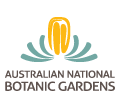 |
In Flower This WeekA weekly news-sheet prepared by a Gardens volunteer.Numbers in brackets [ ] refer to garden bed 'Sections'. Plants in flower are in bold type. |
7 June 2002
 |
In Flower This WeekA weekly news-sheet prepared by a Gardens volunteer.Numbers in brackets [ ] refer to garden bed 'Sections'. Plants in flower are in bold type. |
These cooler days continue to produce many flowers in the Rock Garden where large rocks act as a source of heat, absorbed during the day and radiated slowly throughout the night. So, in a clockwise direction starting from the steps to the south of the waterfall, Banksia integrifolia [Section 15C, 15B, 15L] lies prostrate, edging or across the path. The leaves are a dull green with silver backs, the upright flower spikes are a soft lemon. Lechenaultia formosa [Section 15D], here and there, is a tiny, rounded, prostrate plant bright with scarlet flowers, while, across the path, Homoranthus darwinioides [Section 15F] is an old rounded shrub with grey-blue foliage, bearing unique cream flowers which redden on ageing. In the centre of this bed, Alyogyne ‘West Coast Gem’ [Section 15F] stands tall with open purple hibiscus flowers while Guichenotia macrantha [Section 15F], not so tall, is an open shrub with grey foliage and soft pink bell-shaped flowers. Zieria odorifera [Section 15F] is a small shrub, compact against the rocks, clad with small pink and white flowers.
Grevillea lanigera [Section 15W] covers this slope with pink and cream spider flowers over the prostrate plant. Close by Micromyrtus ciliata [Section 15G], so neat and low, has arching branches of warm red buds, just beginning to open to small white flowers. Verticordia pennigera [Section 15W], against the rock, is a dwarf shrub clad with soft pink frilly flower clusters.
At the top of the stairs, Pimelea longifolia var. longifolia [Section 15A] has terminal heads of small white flowers over the dwarf shrubs. Along this upper road Dampiera diversifolia [Section 15H] has deep blue flowers along its trailing branches while Dampiera sylvestris [Section 15H] is dense, upright and suckering, also with blue flowers. Overlooking the Rock Garden, the yellow straw daisies of Bracteantha bracteata throughout the area are so bright.
On a lower level, Isopogon cuneatus [Section 15P] is a medium upright shrub conspicuous with large showy pinkish-mauve flower heads. At its base, Hakea clavata [Section 15P], whilst not so colourful, is interesting with a few maroon buds and pink-cream flower clusters along prostrate stems of narrow succulent-like sharp pointed leaves. Around the corner Hakea myrtoides [Section 15 P], also prostrate, has deep red flowers conspicuous along the terminal branches. Take time to marvel at the bed almost covered with Scleranthus biflorus [Section 15N], a spreading moss-like cushion plant, so green, so dense.
Edging this path, Correa pulchella ‘Pink Mist’ [Section 15S] is dense and upright with its tubular flowers pendent from the branches. Opposite, Prostanthera magnifica [Section 15R] has lovely purple-mauve bugle flowers over the small plant while Scaevola calliptera [Section 15R] has bright blue flowers over a ground hugging plant, Pityrodia sp. [Section 15R], quite small, has arching branches of mottled pink bugle flowers and Dampiera juncea [Section 15R] is dense and dwarf and a mass of blue flowers.
Cooling days, such colourful flowers … Barbara Daly.
| Return to: | Australian National Botanic Gardens | Previous
'In Flower' Weeks |